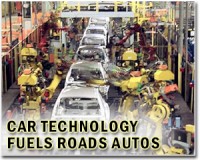 Thompson Files: Wisdom on the bailout
Thompson Files: Wisdom on the bailout

disclaimer: image is for illustration purposes only |
by Loren B. Thompson
Arlington, Va. Dec 23, 2008
Like Ebenezer Scrooge awakening on Christmas morning to the error of his ways, U.S. President George W. Bush has belatedly discovered the danger of relying too much on market forces.
Earlier this month Bush agreed to provide bridge loans to imperiled domestic automakers that collectively account for over a quarter of the world's largest car market -- and a sizable chunk of markets in Europe, Latin America and elsewhere. Looking beyond the shortsighted biases of his Republican brethren in the U.S. Congress, the departing 43rd president acknowledged what everyone should know by now: These are extraordinary times demanding extraordinary measures.
If ever there was proof that being president of the United States can open a man's eyes to the difference between ideology and wisdom, then surely this must be it.
It would have been an act of criminal stupidity to allow the collapse of America's automobile industry simply because "market forces" conspired to produce record oil prices and credit paralysis in the same year.
Doctrinaire conservatives may not be able to see the paradox of denying Detroit $13 billion while sending a similar amount to Baghdad each month, but George W. Bush and his vice president, Dick Cheney, did.
Thank God they had the sense to follow the example of Winston Churchill, who once observed: "The duty of government is first and foremost to be practical. I am for makeshifts and expediency. ... I would not sacrifice my own generation to a principle."
There's a lot about the auto bailout that voters don't understand. They don't realize that General Motors and Ford lots are already full of fuel-efficient cars. They don't realize that if the United Auto Workers union accepted parity with non-unionized auto workers today, it would only shave $800 off the price of cars that already sell at a $2,500 discount to comparable Japanese brands.
They don't realize Buick is the only make in the world that has matched Lexus for quality -- Cadillac and Mercury were close behind.
But the purpose of this brief isn't to defend Detroit, it is to ask whether the flexibility George W. Bush has exhibited on issues like the auto bailout and the Iraq troop surge might not provide a useful lesson for President-elect Barack Obama.
When Sen. Obama, D-Ill., began his quest for the presidency, the United States was a wealthier place than it is today. So it was very much in character for a liberal Democrat to call for higher taxes on the rich that could finance national healthcare and investment in alternative fuels to slow global warming.
However, times have changed. It may still make sense to raise taxes on the rich, but this economy can no longer afford some of the big initiatives candidate Obama had in mind.
Take healthcare: The last census found 46 million people without medical insurance, but a third of those people were eligible for programs like Medicaid and simply hadn't applied. Another fifth made more than $50,000 annually but hadn't purchased private health insurance. Does the incoming Obama administration really need to reform the healthcare system at a time when the national debt is already increasing at a rate of several billion dollars per day?
And then there are all those energy initiatives to slow global warming.
Private-sector investment in alternative fuels is plummeting, because with oil selling for $40 a barrel, it is impossible for the alternatives to compete without market-distorting subsidies. The only way to fund such subsidies right now is to borrow the money from our children. Is that any more responsible than borrowing money from our children to send troops to the Persian Gulf?
If Obama uses the auto bailout to impose expensive alternative-fuel technology on Detroit at a time when the market won't support it, he will doom Detroit for sure. So maybe Obama should follow the Bush -- and Churchill -- example, by saying: "We need to do whatever it takes to fix this economy -- we'll get back to the big ideas later."
(Loren B. Thompson is chief executive officer of the Lexington Institute, an Arlington, Va.-based think tank that supports democracy and the free market.)
Related Links
Car Technology at SpaceMart.com
 Chinese owner threatens to abandon SKorean carmaker : MP
Chinese owner threatens to abandon SKorean carmaker : MP
 Seoul (AFP) Dec 23, 2008
Seoul (AFP) Dec 23, 2008
The Chinese owner of South Korea's Ssangyong Motor has threatened to abandon the ailing automaker if its union rejects restructuring, a senior MP said Tuesday.
|
 |
|

 Seoul (AFP) Dec 23, 2008
Seoul (AFP) Dec 23, 2008